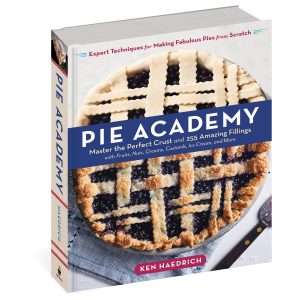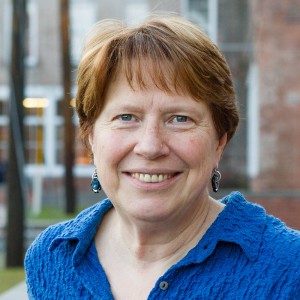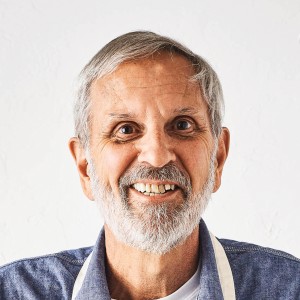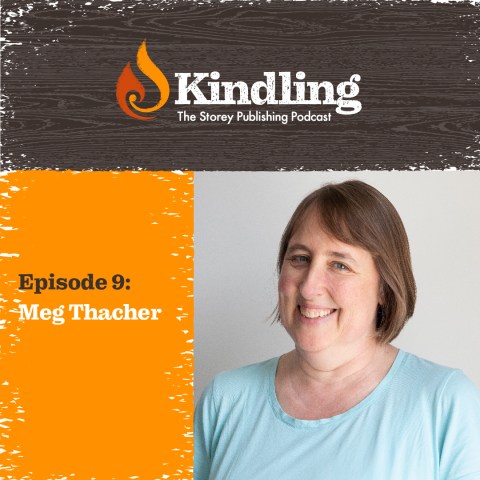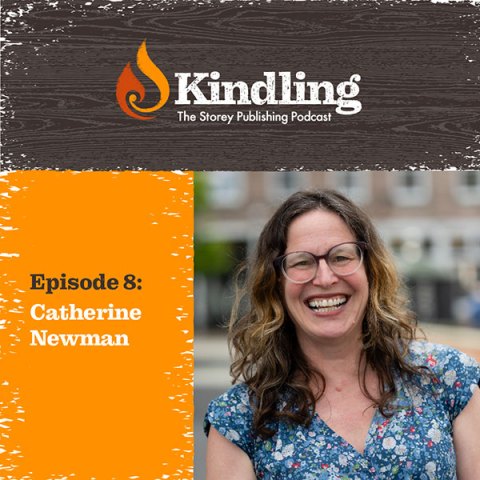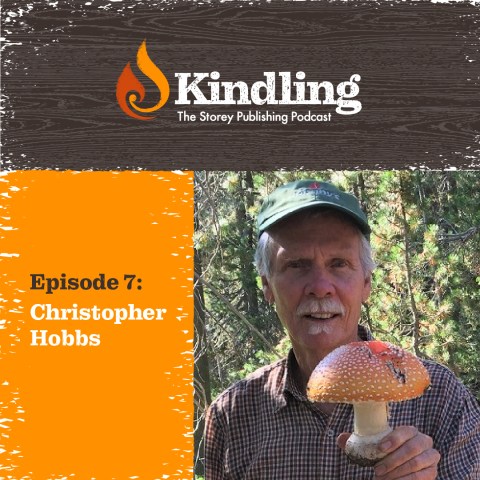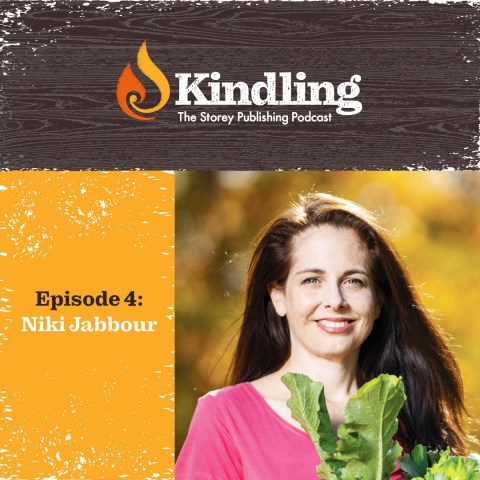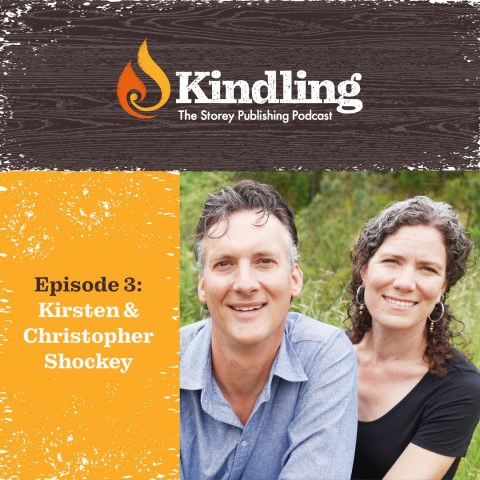Kindling Podcast Episode 5: Ken Haedrich
Tune in as Storey art director Carolyn Eckert speaks with Ken Haedrich about his book, Pie Academy.
In this episode, Pie Academy cookbook author, Ken Haedrich talks about the community he’s created around baking pies. From watching his parents make apple pies and baking with his kids at home, to creating the Pie Academy, which has nearly 4,000 members. Plus, he offers helpful tips like how to know when your fruit filling is done and how parents can introduce their own kids to pie-making.
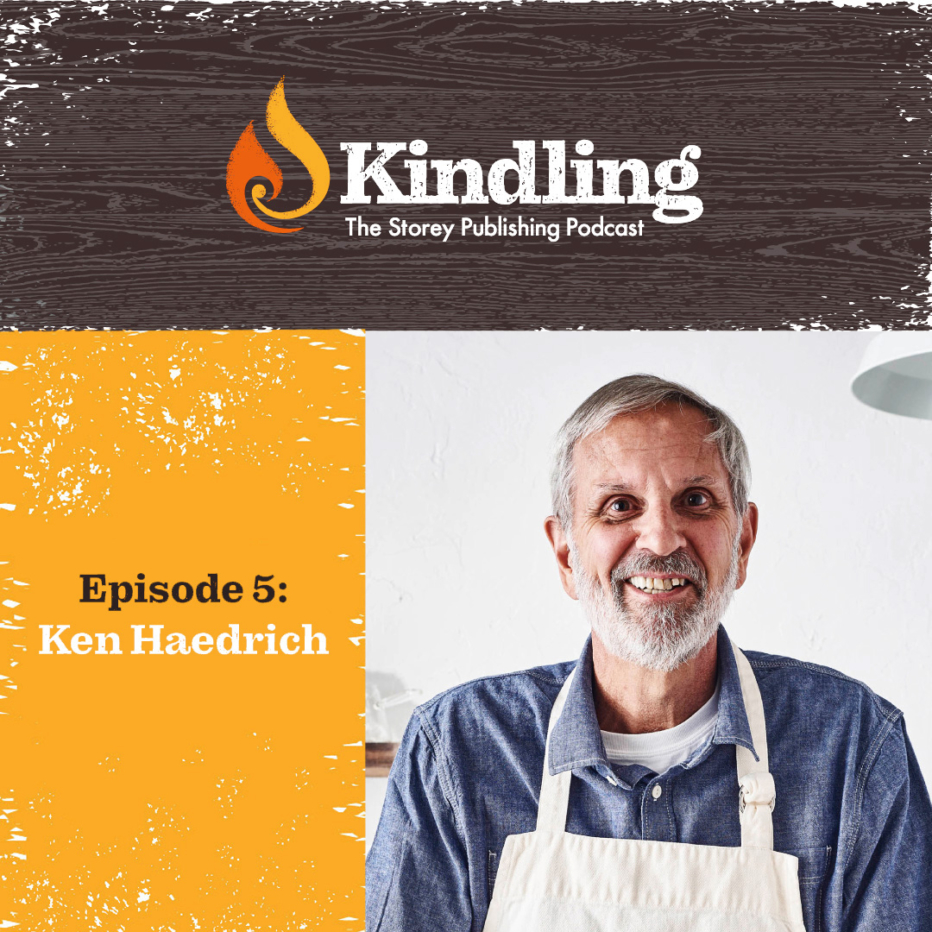
This episode of Kindling: The Storey Publishing Podcast can also be found on podcast platforms including Spotify and iTunes. If you enjoyed this episode please be sure to leave us a rating and review.
Full Podcast Transcript
Deborah Balmuth:
This is Kindling, the Storey Publishing podcast, where we explore the spark that ignites a deep-rooted passion for sustainable living. I’m Deborah Balmuth, Storey’s publisher.
Deborah Balmuth:
From growing organic food and making herbal remedies to fermenting weaving and raising chickens, the authors we’ll meet will empower you with the skills and savvy they’ve gleaned from years of hands-on experience. In each episode of Kindling, you’ll learn what fuels these authors’ excitement, and what they love most about creating books that share their expertise and enthusiasm with the world.
The author we’ll meet today is the Dean of his own Academy, The Pie Academy. Ken Haedrich created this online resource to teach people of all skill levels how to bake delicious pies. He’s also authored numerous pie cookbooks. He’s even hosted pie getaways, where he invites bakers across the country to come meet him and hone their pie-making skills.
Deborah Balmuth:
Ken recently spoke with story art director, Carolyn Eckhart, about his passion for pies.
Carolyn Eckhart:
Good morning, Ken Haedrich.
Ken Haedrich:
Well, thank you for inviting me.
Carolyn Eckhart:
You’ve mentioned that watching your mom cut the apples, and dad make the pies when you were young, is your inspiration for making pies? Was this a weekly occurrence at your house?
Ken Haedrich:
It was a weekly occurrence in the fall, for sure, and throughout much of the summer. We had a Woody station wagon back in those days, and they used to load us all in the car on a Saturday or Sunday, and we’d head out into the Watchung Hills, near Plainfield, New Jersey, where I grew up. And it was just one of these family things where we go get as many apples as we could, bushels full of apples.
And then we’d come home, and my folks would go to the kitchen and start making an apple pie. It was just such a wonderful thing to watch. And I’m convinced now that the kids were never really invited to help, because this is probably the only thing they could do by themselves during the whole week, because raising seven kids, that work is nonstop.
So this was just something they shared together, that they loved doing together. But it was just so much fun to watch them go through the steps of making the pie. Dad often just used the recipe on the Crisco can. I tell you though, just those pies, unfancy as they were… I’m sure they weren’t obsessed about the type of apples either, like people are now, but those pies are the best pies in the world.
And I think having that routine, watching that ritual, and then having a chance to have a big piece of pie afterwards, that really stuck with me, and to this day, I can’t make a pie without thinking of them and thinking of that lovely ritual that they had.
Carolyn Eckhart:
How old were you when you finally made your first pie?
Ken Haedrich:
So this goes way back to when I was 18, 19, 20 years old. When I went in the Navy. I had a friend who, his father had a restaurant in the Buckhead section of Atlanta, and we would drive up. And his mother was a wonderful home baker. And she was really the one who sort of reignited this flame for me of loving to bake. She baked all the time when we were there, and she would make great pies too. And it was sort of that, that got me back on track remembering, “Oh yeah, I remember mom and dad doing this.”
So I started making pies on my own. Because a bunch of buddies and I, we would always get a place off base, and that’s really when I started doing it on my own. Then it really kicked into high gear later on, when I got out of the Navy and moved to New Hampshire and started working at the kids home.
Carolyn Eckhart:
Did she teach you any specific tricks, do you remember, about first making pies?
Ken Haedrich:
She probably did, but those are long lost to memory. But what she did do is, she shared her excitement and love of baking. And I think that that’s the thing that stuck with me.
And that’s the thing that I hope comes across in Pie Academy and all my other books, is that, I really love making pies. I love the process, just handling the ingredients, shaping the ingredients, cutting the fruit, beating the eggs, making it all come together. To me, it’s all in the process and the joy of the process. And it’s a hard thing to get across in a book. But that’s what I try to do. I try to share that love and passion for baking.
Carolyn Eckhart:
I read a lot about your Pie Academy, and you said, “I feel like my whole life has been an attempt to recapture the feeling of being in my parents’ kitchen, the good feelings of conviviality.” And that was your quest to recreate your dad’s apple pie.
And I really liked what you said, that, “Writing for print, the audience is invisible, and you cannot share your ideas or hear them immediately, but people like to know about them. So I wanted to get back to the simple connection of two cooks sharing recipes. I wanted to create a community.”
I thought about it, and it was like your whole life, you’ve been surrounded by a group of people. First, your family, then the Navy, then the home for kids. So how do you think the Pie Academy succeeds and creating that community for you?
Ken Haedrich:
Oh, that’s a good way of putting it. And I didn’t think of that. One big block of people that you left out there was my own children. I have four of my own children. And years and years, of course, when you have little kids, it all goes by like a blur. But when you add them into equation, there’s no doubt that then this is an extension for me of just having a community around food.
I’m so appreciative for each and every person, because it is like having a big extended family. We have about 4,000 members of the Pie Academy. And religiously, I get emails from them. It’s just like they’re family. I’ve got one old guy. His name is Lee the Baker. I think he’s about 90 years old. He sends me an email about once a week with something he’s baked. This guy is amazing.
One time he sent me a photo of himself in the bowels of a small ship that he was stationed on off the coast of Vietnam. It was just him surrounded by loaves and loaves of bread, in this dingy little kitchen in the ship. And he’s just a young guy. He’s got a big smile on his face in the picture. And I love seeing stuff like that.
People send me photos of their pies all the time. And it’s just, that’s when I know something is working, when I know that people understand that I want to see those photos, I want to hear their stories, that I want to cultivate this sense that we are community, because that’s such an important piece of life and of eating.
Carolyn Eckhart:
Yeah. You’re inspiring everyone and then they want to share back and it’s sort of paying it forward all around. That’s awesome.
Ken Haedrich:
I love that.
Carolyn Eckhart:
And so you said that you answer every email. Have there been any crazy requests or questions that have stumped you ever?
Ken Haedrich:
The thing that people have the most problem with in pie making, this is where a lot of the nuance comes in. I always say you can learn to be about 80% proficient as a pie maker in a relatively short amount of time. A few months of regular pie making. But then you can spend, and I still am, you can spend the rest of your life learning the nuances of that 20% that makes you world-class pie maker.
And I went by world-class, I don’t mean fancy top cross or anything like that, I’m talking about just a perfectly baked pie with the really crumbly, beautiful crust, and the filling done just so.
But the thing that, getting back to what you asked me, the thing that trips people up the most is essentially everything about the crust. For instance, how much water do I add to the crust? It’s my crust, I’ve added the amount of water that you said, but it seems to be crumbly, or it seems to be too wet, or it shrinks on me. And they’ll send me a sentence or two and say, my crust did this, what did I do wrong?
And inevitably, I’ll have to ask about eight questions to, okay now, what type of fat did you use, what were the proportions? What type of flour did you use? Again, that’s what we’re all in, that 20% now, of things that go wrong. Those nuances that take a lifetime to learn.
So to answer your question, anything to do with the crust is usually what bugs most people, it’s usually not… I started to say, it’s usually not the filling, but here’s the big thing about the filling that people constantly write me about.
My fruit filling was runny. It didn’t look right. And I cut a piece and the juice ran all over the place. And every time my answer is pretty much the same. You didn’t cook the pie long enough. And people are often a little bit nervous about leaving the pie in the oven, a fruit pie in the oven, because they see the crust starting to brown, and it’s getting even a little more brown.
But until you see those juices bubbling up through the vent holes that you made, or up through the lattice, or along the edges if you have a crumb topping on, your pie is not done, your juices have to boil and they have to stay there for a few minutes. That right there, for anybody listening, the 80% of people who are having problems that were filling, that’s the answer. I can guarantee you.
Carolyn Eckhart:
You said that for the book, it took nearly two years of research and development to get all the recipes down pat. Are the main issues about crusts and fruit pies?
Ken Haedrich:
Well, every category has their little nuances. Any pie that’s made with eggs, like chess pies or custard pies or things like that, people often cook them too hot. Eggs are one of those things where they need to be coddled. If you’re going to bake any sort of a pie with eggs in it, especially custard eggs, my go-to advice is low and slow. You don’t want to rush a custard pie or a custard without a crust. If you do, and the temperature gets too hot, you’re going to, especially if there’s no other thickener in there, the custard, the eggs, are going to break, and they’re going to separate into tiny scrambled eggs, and all the liquid’s going to run out.
So that’s another common issue with any pie that’s made with eggs. So each category has their own little nuances, but the big one is definitely the fruit pies.
Carolyn Eckhart:
If parents were going to introduce their young kids to pie making, what pie would you suggest for them to make for an easy success?
Ken Haedrich:
This is what I would do. And this is what I always did with my little kids when they were little. They’re no longer little. They’re big kids, but what I would do when I made a pie, there’s always going to be a little bit of dough scraps left, and I would take those dough scraps, and I’d put them in a pile and divide them up.
And they would each have a little rolling pin of some sort or another, or they used one of my big rolling pins, and they’d make their own little pie. I always keep a little pie tins around, the ones that hold about a cup of filling. Of course, they’d make a total mess of it. The dough would stick the table and all that stuff, but that didn’t matter because they were having a great time and they got to sprinkle flour and play with fruit.
And I’d always leave a little bit of extra fruit in the bowl from whatever big pie I was making, or even a custard pie or something like that. I’d always just leave enough for them to make their little pies.
So that’s the way I would start them. If you wanted to do something a little more structured, I would say one of the pies with a graham cracker crust, those are not very challenging. Especially if your kids are young. Make up a graham cracker crust, or it could be any crumb crust. We have a number of them in Pie Academy. And divide it up between little pie tins, and then put some kind of a cream pie filling or something like that in them.
The kids, at that age, they just love to plop stuff in the crust. And they love to press the crust in the pan if you’re using a graham cracker crust, that’s a big thing for them. Give them their crust and let them press it into the pan. All those things, it doesn’t really matter. The whole idea is to get them just acclimated to being there baking with you. To me, that’s a very nice gift you can give a child, is to involve them in your family meals like that.
Carolyn Eckhart:
Now that we’re in the time of the pandemic, and everyone is home cooking more, and their own food. You’ve said that, “Baking is an activity that we crave. Many of us are starved for the tactile distraction. Baking engages our senses, grounds us in the present and focuses our creative energies.”
How do you think the pandemic has changed baking at home? Has it always been the same in the last 100 years to now? Or is it different now, do you think?
Ken Haedrich:
Based on nothing else than the how difficult it was to get flour for a while, definitely more people I think turned to baking. Now, whether this is going to be a long term bounce that we experienced, with people taking up baking… Sourdough bread and bread making seemed to be another thing that people got very interested in. I don’t have any data on how much of those flour sales went towards people who are baking pies, but I can imagine quite a bit of it.
However, I will say this, pie making is something that scares people. And this is one of the things I hope I can do in Pie Academy, is to just put people at ease about making pie, because I know people who make great quick breads, they make great sourdough breads, and yeast breads, but you start talking about pie, and they’ll say, “Oh, don’t go there. I don’t go there. I just can’t do a pie.” So hopefully pie making did, and will get a bounce from Coronavirus. People staying at home more, but just how much, I don’t know. We’ll see. We’ll see.
Carolyn Eckhart:
You said, “I like spreading the word and encouraging people, inspiring them, then everyone can make a great pie.” And so, to finish up, do you have words of encouragement, or are there tips or tricks you would tell someone if they’re going to make their first pie?
Ken Haedrich:
Don’t expect to be proficient overnight. There’s plenty of trial and error. Just stick with it. I tell people to love their ugly pies. You’re going to make a lot of ugly pies. I still make ugly pies. Stuff bubbles over the edge and the crust cracks or whatever. Don’t worry about it. The more you do it, the better you’re going to get at it.
There’s a story I love about a pottery teacher who tells his class one day… He has all these new students. And he says to half of the class, “I want you to make as many pots as you can this year. Your final mark is going to be based on the total quantity of the weight of the pots that you make.”
And he says to the other group, “I want you guys to just take your time, make one beautiful pot, and just make it be excellent.”
And so the semester goes by. And at the end of the season, what he found was the ones who just sort of let loose and made pot after pot, and didn’t care if it fell apart or fell down or whatever, or had dings on it, they were the ones who made beautiful pots in the end. Their pots looked great, because they just threw themselves into it and practiced, and didn’t care that much about the end result.
Whereas the ones who were trying to make the perfect pot… When you’re trying to do something perfectly, you’re all uptight and you’re never satisfied, and all this kind of stuff. So the motto being, just throw yourself into it. Make a lot of pies that you’re not crazy about. Because first of all, people are going to love them and they’re going to eat them, even if you don’t think they’re perfect. And second of all, that’s how you get good. You just got to keep doing it.
Deborah Balmuth:
That was Storey art director Carolyn Eckhart, speaking with Ken Haedrich, Dean of the Pie Academy, and author of more than a dozen cookbooks, including Pie Academy, The Harvest Baker, and The Maple Syrup Cookbook.
To learn more about Storey Publishing’s books and authors, visit storey.com. That’s S-T-O-R-E-Y dot com. And if you have questions or comments about what you hear on Kindling, let us know. You can email us at feedbackatstorey.com.
That’s it for this edition of Kindling, coming to you from the Berkshire Hills of Western Massachusetts. I’m Storey’s publisher, Deborah Balmuth. Thanks for listening.
Learn More
“The wide-ranging, well-curated mix of classic and contemporary recipes and expert advice make this an essential primer for avid home bakers.” – Library Journal, starred review
“Readers will find everything they’d ever want to know about making pie, and even the dough-fearful will feel ready to measure, roll, and cut.” – Booklist, starred review
“Fear of pie? Ken Haedrich to the rescue. Pie Academy takes you through everything pie related — perfect crusts, fillings, crimping techniques, blind baking, lattice toppings and more.” — Kathy Gunst, coauthor of Rage Baking and resident chef for NPR’s Here and Now
“A true baker’s delight.”— Amy Traverso, Yankee magazine food editor and author of The Apple Lover’s Cookbook
Trusted cookbook author and pie expert Ken Haedrich delivers the only pie cookbook you’ll ever need: Pie Academy. Novice and experienced bakers will discover the secrets to baking a pie from scratch, with recipes, crust savvy, tips and tutorials, advice about tools and ingredients, and more. Foolproof step-by-step photos give you the confidence you need to choose and prepare the best crust for different types of fillings. Learn how to make pie dough using butter, lard, or both; how to work with all-purpose, whole-wheat, or gluten-free flour; how to roll out dough; which pie pan to use; and how to add flawless finishing details like fluting and lattice tops. Next are 255 recipes for every kind and style of pie, from classic apple pie and pumpkin pie to summer berry, fruit, nut, custard, chiffon, and cream pies, freezer pies, slab pies, hand pies, turnovers, and much more. This beast of a collection, with gorgeous color photos throughout, weighs in at nearly four pounds and serves up forty years of pie wisdom in a single, satisfying package.
